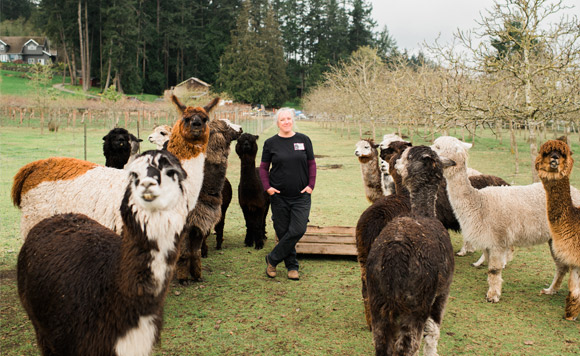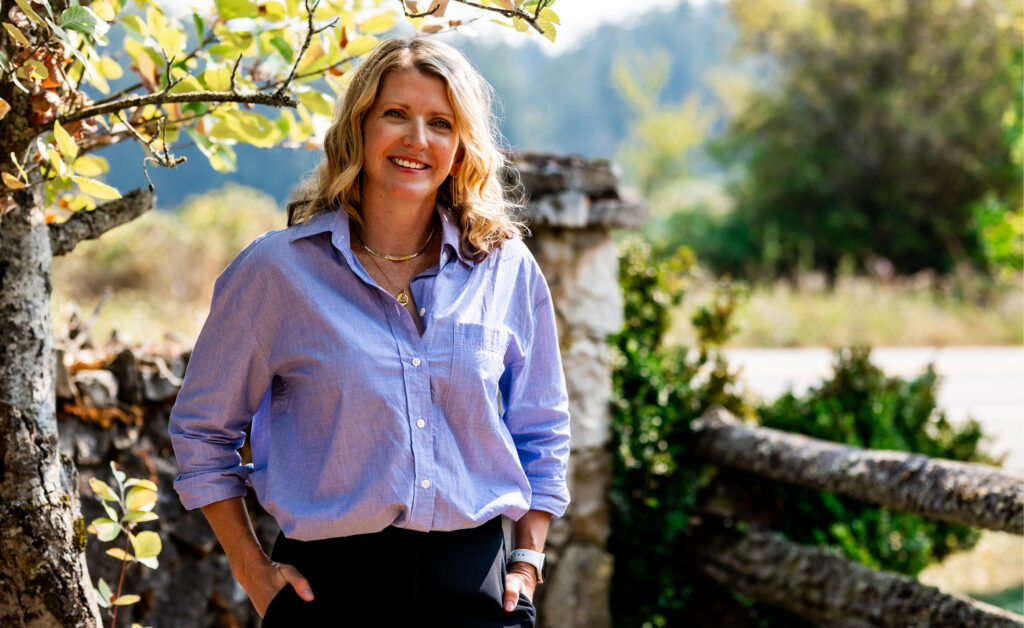by Jo Barnes –
Many years ago living on the Saanich Peninsula required people to draw their sustenance directly from the land upon which they lived. While most of us today rely on grocery markets and at best tend to backyard gardens, there are still those in our community for whom living off the land is a way of life. This is the third in a Seaside series featuring local community members who all share the same passion for the land and love of what they do.
She loves her production crew and gives them whatever they need. In return they’d give her the coat off their back … and they do so regularly!
Tracy Brennan, owner of Inca Dinca Do Farm & Fibery on McTavish Road in North Saanich, raises alpacas, which she calls her production crew as she processes their fleece into yarn.
“Following the fleece from start to finished product is really exciting,” shares Tracy. “We provide service to other farmers. Anything I can do to support fibre and fleece industry on the Island I will.”
Years ago, Tracy raised sheep on a property off Starling Lane overlooking Elk Lake. She asked the shearer one day what to do with the fleece, and he told her essentially it would be thrown away. As an avid knitter, she was stunned by his answer.
“I’m driving downtown and buying wool from New Zealand, and I have sheep in my own yard. This just doesn’t make sense,” says Tracy.
She decided to buy a small spinning wheel and began to teach herself how to spin.
“It took me the entire winter to process one sheep’s fleece by hand, but I learned a lot,” she shares. “I did that again for the next year and ended up processing 17 sheep fleeces through the next winter.”
Eventually she decided to raise alpacas instead of sheep, as it was the same amount of work shearing them with slightly more potential for profit. The decision meant another learning curve.
“The only alpaca vet is in Mill Bay and he doesn’t do house calls, so I’ve had to learn to do all my own herd maintenance, all my own shearing, toenail trimming, shots, injections, everything.”
The current 5.2-acre farm was originally purchased by her father in 1979. It was the first of its kind on the Island to produce kiwi, a popular fruit still harvested today at the site. Tracy’s parents offered to board her alpacas there; she agreed. When Qualicum Bay Fibre Works went on the market in 2017, Tracy decided to realize her dream of establishing her own fibre mill on the Saanich Peninsula. It was an ideal way to retain her ever-growing alpaca herd, revitalize the farm, and stay close to her aging parents.
She gradually acquired all the mill equipment necessary to transform raw fleece into yarn. This in itself was an accomplishment, as some of the pieces date back to the 1870’s and could be considered museum artifacts. This attention to detailed, authentic processes of yarn production helps connect this modern-day farm to local historic roots.
In 2018, after much planning, equipment adjustments, and construction of a new mill facility, Inca Dinca Do, the only fibre farm on Vancouver Island, opened its doors. The catchy name, based on the old Jimmy Durante song, aptly reflects the energy, creativity and joy of this business.
“I wanted a name that would be memorable. The Inca Dinca Do song from Jimmy Durante, that’s a fun song. I tell people the name and they never forget it,” says Tracy.
Customers come from all over, bringing their fleece and their enthusiasm.
“Our customer base runs the spectrum from farmers who have no idea what to do with fibre all the way to fibre artists,” says Tracy. “We are on a 90-day turnaround, from fleece to yarn, and will custom process wool, mohair, alpaca and llama.”
It’s a lifestyle Tracy finds deeply satisfying because the product is renewable and the business beautifully ties in with environmental sustainability.
“There’s a huge push for the 100-mile diet. It’s transitioning into other ends of the spectrum and that includes our clothing. The clothing industry is a huge drain on the resources of the world. It’s one of the worst carbon footprints, so the idea of being able to process the fibre for the textile industry and fall within the 100-mile plan is really appealing,” shares Tracy.
The daily work is hard, but this self-taught farmer strives to make a difference in our throw-away society by working with a renewable resource, providing services to other farmers, and educating the community. The rewards are immensely satisfying.
“It’s hard work being a farmer, but I’m absolutely privileged to live this lifestyle,” says Tracy.




